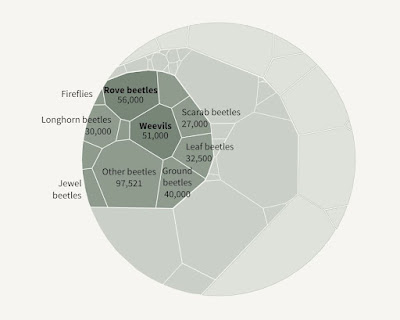 |
| "Species in the animal kingdom can be split into vertebrates and invertebrates." |
In The Collapse of Insects, I learned that the entire population of insects is decreasing by 2% per year. Not much to worry about given that there are billions of insects in the world. Right? Wrong. Yet many scientists laughed off the warning last year as alarmist in an age of alarmism. The population may be declining, but it could be caused by so many variables, and there are so many bugs. Not to worry.
I remember as a child I would look closely at the hundreds of insects in the grill of my father's huge car. I would wonder how the bugs—the moths, beetles, dragonflies, butterflies, and all the others—of the world could survive this slaughter when multiplied by all of the cars the world over. I absolutely hated having to wash dead insects from the windshield. It wasn't just the problem of hating bug goo. It was the lives I was just wiping away.
 |
| "With over 387,000 species, Beetles make up around 24% of all animal species." |
I have been re-thinking my childish thoughts and pondering the scientists of denial. I have concluded that I was right and they are wrong. I wanted to believe them, actually. There could be a little spark of optimism in our freaky world. But there isn't.
 |
| "The beetle order can then be divided into families, with rove beetles and weevils making up the two largest families." |
I lifted these graphics and text from the article for two reasons. The most important reason is that I did not want to lose the information in my computer data swamp. The second reason is that somebody that reads this may also find them interesting. They don't just illustrate numbers. They show how complex the world is. Why are there at least a million more species of insects than birds? It's the old predator/prey thing: you need more prey than predators in order to keep the predators alive. If you ask why? to many of these numbers you could become overwhelmed by how important insects are to the world. They are the beating heart of our planet. Would life on the planet continue without humans? Yes. Without insects? No.
 |
| "There are more species in the two most diverse beetle families than in all vertebrate classes." |
The article nicely explains how this catastrophe favors the non-native insects we have imported deliberately or not deliberately: they will do better than the native moths, butterflies and beetles. The old joke is that the cockroach will survive World War III, even a nuclear holocaust. Insects like cockroaches, or other "pests," have become generalized eaters. They have so many choices of food that they can survive. What about our insects that only feed on nectar? Or on one species of another insect? Or whose larvae can only grow and develop on one species of plant? In one type of biome? Well, they will be gone first. Climate change is changing the time that plants bloom and provide food for so many insects. They bloom so early that the insects hatch into a world with no food. The survivors may survive so late into the season that they are fooled by warm autumns and are not ready for winter. Yeah, it's a disaster.
The only thing I can do to mitigate this is to talk about it with others. And I can vote. I fear those are the only things left for ordinary citizens to do.
 |
| "There are more longhorn beetle species than bird species." |
The numbers are incomprehensible. How many hundreds of years will it take for billions of bugs to all become extinct? I made a spreadsheet for 100 bugs. You can think of 100 bugs of one species only or of different species; but you can't think 100 species. That would be implausible: there would be no other bug of the species to mate with.
 |
| "There are about the same number of ladybug species as mammal species." |
After 20 years, there are only 66 of the individuals left of the original 100. Of course, none of my original 100 died from predators, bad weather, disease, or human activity. Also, they did not have any offspring. But the statement said "2% of the population," which includes offspring.
 |
| "There are more weevil species than fish species." |
My spreadsheet after 20 years:
Year 115 brings me to single digit population:
If there were 50 species in the original 100 bugs, all bugs are gone by now. Many species died before year 115 because of starvation or low numbers when the count began. Don't forget the species that can only survive because their larvae parasitize other insects. They were gone long before, also.
Just for laughs, I continued the spreadsheet to population zero. It is meaningless because the insects will hit zero way before this linear progression. The population seems to stay the same because of rounding, but it was continuously dropping.
I'm not going to extrapolate this pitiful spreadsheet to the real world. It did its job and told me that things will get bad very quickly.
Talk to others.
Vote.



Bless you for caring
ReplyDeleteThere are also insect species that we do not know of. Thanks for the great information
ReplyDeleteGreat research!
ReplyDeleteThat's really sad, extinction is scary.
ReplyDeleteAnd still we are indifferent.
ReplyDeleteWe did it to ourselves, and it's not going to be pretty.
ReplyDeleteYes, we need to educate others and vote, and hope the others care and vote.